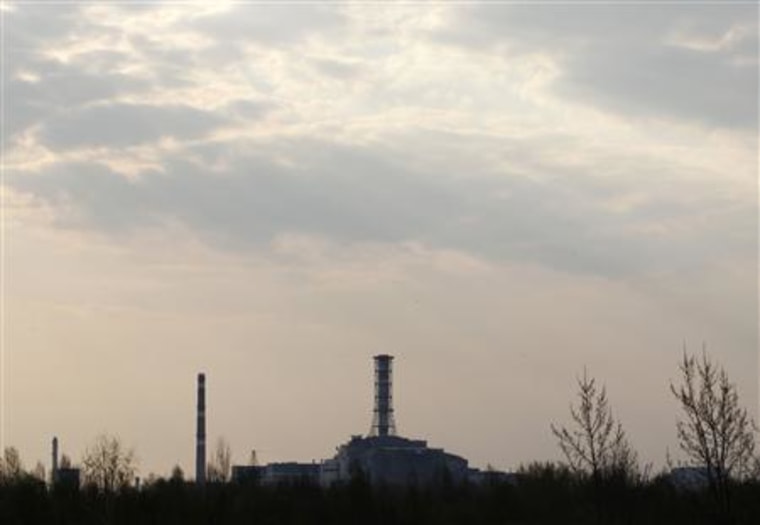Ukraine marked the 25th anniversary on Tuesday of the world's worst nuclear accident at its Chernobyl power plant as Japan pressed on with efforts to control the crisis at its Fukushima plant.
On April 26 1986, the No. 4 reactor at the Chernobyl plant, then in the Soviet Union, exploded and caught fire after a safety test experiment went badly wrong.
The blast sent radiation billowing across Europe.
A total of 31 people died immediately but many more died of radiation-related sicknesses such as cancer, many of them in what is today Belarus.
Tens of thousands were evacuated, never to return, from Prypyat, the town closest to the site which then had a population of 50,000.
Last week the world community, spurred by the nuclear crisis at Japan's Fukushima plant, pledged $780 million to help build a new containment shell over the stricken reactor at the Chernobyl site to replace a makeshift one that has begun to leak radiation.
'Planetary dimensions'Ukrainian President Viktor Yanukovich used the 25th anniversary of the Chernobyl nuclear disaster to renew calls for money to build the new shelter over the reactor, saying no nation can battle such a tragedy alone.
"We have paid for the peace of the planet with the lives and health of thousands of compatriots," Yanukovich said in a statement on his website.
"But not a single nation, even the most powerful, can overcome the consequences of a catastrophe of such a scale by itself," the leader said. "Chernobyl was a challenge of planetary dimensions. The answer to this challenge can be provided only by the world community."
Yanukovich visited Chernobyl later Tuesday with Russian President Dmitry Medvedev and Russian Orthodox Patriarch Kirill to take part in a religious service outside damaged reactor No. 4.
The leaders laid the first stone of a monument to cleanup workers and placed bouquets of red roses at another monument to Chernobyl victims.
Medvedev said he has invited world leaders to work on rules for safer nuclear energy. His economic adviser, Arkady Dvorkovich, said Russia forwarded its proposals Tuesday to leaders of other Group of Eight countries, and he hoped they would be discussed at next month's summit in France.
"It's of utmost importance that we understand what kind of force humankind is dealing with so that our solutions ... meet the challenges of nuclear energy," Medvedev said.
Ukraine still needs to raise some $300 million for the project after an international donors conference held here earlier this month.
The disaster has remained the benchmark for nuclear accidents.
Though Chernobyl town itself was relatively untouched by the accident, Prypyat is now a ghost town at the center of a largely uninhabited exclusion zone with a radius of 19 miles.
On April 12, Japan raised the severity rating at its Fukushima plant to seven, the same level as that of Chernobyl.
Ukrainians, Russians, and Belarusians — the three nations most affected by Chernobyl — began marking the anniversary of the world's worst nuclear disaster in the wee hours of Tuesday.
"This is a day of mourning for us. We are in mourning for the people who 25 years ago fought to protect us," said Gennady Pikul, 50, referring to firefighters and other "liquidators" who at risk to their lives fought to control the blazing reactor.
"We will do everything we can so that this is never repeated," he said.
The $800 million raised at the donors' conference last week will be added to cash already contributed for construction of a new 360-foot high encasement over the reactor and a storage facility for spent fuel.
Land still contaminatedEarly Tuesday in Kiev, Russian Orthodox Patriarch Kirill led a memorial ceremony outside a monument to workers and firefighters who were sent to the station immediately after one of the reactors exploded and who died shortly after from acute radiation poisoning.
The memorial service started at 1 a.m. — around the time of the blast that spewed a cloud of radioactive fallout that spread across much of Europe and forced hundreds of thousands from their homes in the most heavily hit areas in Ukraine, Belarus and western Russia.
The explosion released about 400 times more radiation than the U.S. atomic bomb dropped over Hiroshima.
Hundreds of thousands were sickened and once-pristine forests and farmland still remain contaminated.
The U.N.'s World Health Organization said at a conference in Kiev last week that among the 600,000 people most heavily exposed to the radiation, 4,000 more cancer deaths than average were expected to be eventually found.
Soviet officials in 1986 withheld reporting the accident for two days, provoking Western accusations that a secrecy-obsessed Moscow had hoped to cover the accident up.
Medvedev, meeting survivors of Chernobyl clean-up efforts in the Kremlin on Monday, said there must be greater transparency in nuclear emergencies.
"I think that our state must learn the lessons from what happened — from the now-distant Chernobyl incident in 1986 and the recent tragedies in Japan. Perhaps the most important lesson is the need to tell people the truth," he said.
"Because the world is so fragile and we are all so inter-connected, any attempts to hide the truth — to refrain from talking about something publicly, glossing over a situation, making it more optimistic than it is — these subsequently result in the tragic loss of human lives," he said.
